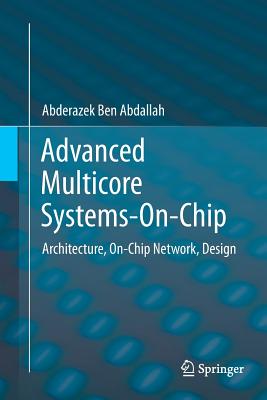Asynchronous On-Chip Networks and Fault-Tolerant Techniques
暫譯: 非同步片上網路與容錯技術
Song, Wei, Zhang, Guangda
- 出版商: CRC
- 出版日期: 2022-05-11
- 售價: $3,630
- 貴賓價: 9.5 折 $3,449
- 語言: 英文
- 頁數: 344
- 裝訂: Hardcover - also called cloth, retail trade, or trade
- ISBN: 1032255757
- ISBN-13: 9781032255750
-
其他版本:
Asynchronous On-Chip Networks and Fault-Tolerant Techniques
海外代購書籍(需單獨結帳)
商品描述
Asynchronous On-Chip Networks and Fault-Tolerant Techniques is the first comprehensive study of fault-tolerance and fault-caused deadlock effects in asynchronous on-chip networks, aiming to overcome these drawbacks and ensure greater reliability of applications.
As a promising alternative to the widely used synchronous on-chip networks for multicore processors, asynchronous on-chip networks can be vulnerable to faults even if they can deliver the same performance with much lower energy and area compared with their synchronous counterparts - faults can not only corrupt data transmission but also cause a unique type of deadlock. By adopting a new redundant code along with a dynamic fault detection and recovery scheme, the authors demonstrate that asynchronous on-chip networks can be efficiently hardened to tolerate both transient and permanent faults and overcome fault-caused deadlocks.
This book will serve as an essential guide for researchers and students studying interconnection networks, fault-tolerant computing, asynchronous system design, circuit design and on-chip networking, as well as for professionals interested in designing fault-tolerant and high-throughput asynchronous circuits.
商品描述(中文翻譯)
《非同步片上網路與容錯技術》是首部全面研究非同步片上網路中容錯及故障引起的死鎖效應的著作,旨在克服這些缺點並確保應用程式的更高可靠性。
作為多核心處理器中廣泛使用的同步片上網路的有前景替代方案,非同步片上網路即使能夠提供與其同步對應物相同的性能,且能以更低的能耗和面積運行,但仍然可能受到故障的影響——故障不僅會損壞數據傳輸,還可能導致一種獨特的死鎖。透過採用新的冗餘碼以及動態故障檢測和恢復方案,作者展示了非同步片上網路可以有效地加固,以容忍瞬時和永久性故障,並克服故障引起的死鎖。
本書將成為研究互連網路、容錯計算、非同步系統設計、電路設計和片上網路的研究人員和學生的重要指南,同時也適合對設計容錯和高吞吐量非同步電路感興趣的專業人士。
作者簡介
Wei Song is Associate Professor in the State Key Laboratory of Information Security, Institute of Information Engineering, at Chinese Academy of Science, China. His current research focuses on the security of computer architectures.
Guangda Zhang is Associate Professor in the Defense Innovation Institute, at Academy of Military Sciences, China. His current research focuses on asynchronous circuit, microprocessor and computer architecture, and fault tolerance.
作者簡介(中文翻譯)
宋偉是中國科學院信息工程研究所信息安全國家重點實驗室的副教授。他目前的研究重點是計算機架構的安全性。
張光達是中國軍事科學院國防創新研究院的副教授。他目前的研究重點是非同步電路、微處理器和計算機架構,以及容錯技術。



























